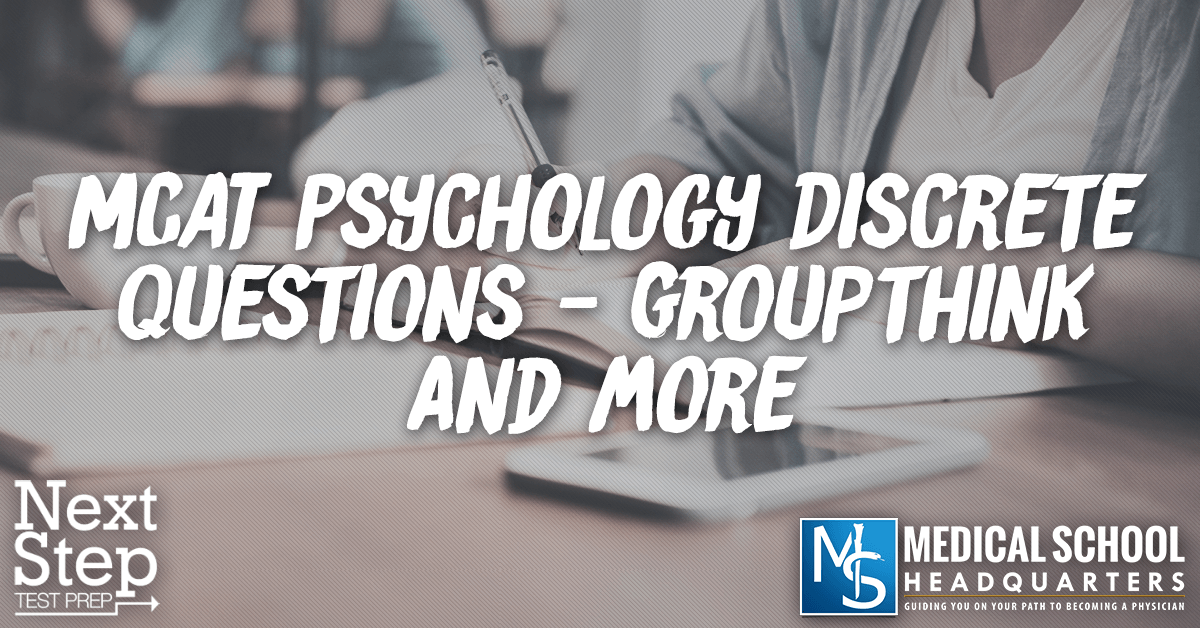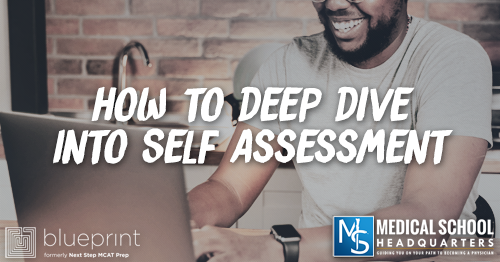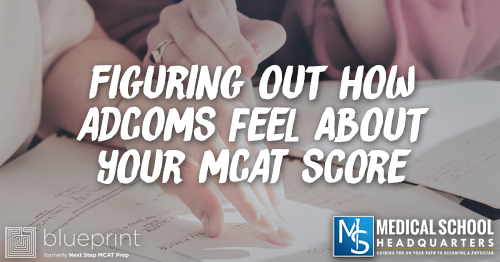Apple Podcasts | Google Podcasts

Session 74
Today, Ryan and Bryan from Blueprint MCAT (formerly Next Step Test Prep) discuss some psychology questions, all to help you get a better score on the MCAT.
Psych/Soc is one of those where there are a lot of very specific things you need to understand. Bryan adds it aggressively rewards lots of memorization.
Click Here to Download Handout
[01:20] The Three Sciences
Also, psych includes some human physiology, which is important to take note of. Although there’s one section of the test titled, Biological and Biochemical Foundations, Bio is actually on three sections. The bio section is obviously 60% bio and then the other sections would contain 5-6% bio questions in them or so they call it, biologically based psychology questions.
So when students are asking about prioritizing their prep, Bryan explains there’s a pretty clear order. Biology is number one. Second and third place, close to each other, are Biochem and Psychology.
If you did nothing but study Biology, Biochem, and Psychology, you could take a decent crack at the MCAT. You wouldn’t do great though. That said, you can’t just skip Orgo and Physics and Soc, etc. But so much of the test is those three sciences.
[02:30] “Operationalizing” Feelings of Stress
Question 10: Survey responses can be prone to subjective bias due to varying interpretation of questions. Blood levels of which of the following would best operationalize feelings of stress?
- (A) Cytokines
- (B) Epinephrine
- (C) Cortisol
- (D) Free radicals
Insights:
The right answer here is (C). Just to recognize the word “operationalize,” it’s just a fancy way of putting a number on a concept that is difficult to put a number on.
For instance, how do you operationalize a concept like social connectedness? You can operationalize it by counting the number of text messages a person sends. So this is a very countable thing.
In terms of feelings of stress, some people deal well with it so they may report on not feeling stress. Other people may report high levels. And if you want to put a number on it, you can do blood test and you can report levels of cortisol found in the blood.
Just as a review, Cytokines are generic signaling molecules not specific to stress. Everything gets signaled by cytokines. Epinephrine is the fight or flight hormone, so very immediate type of stress. And free radicals are just damaged molecules that are both a result of normal aerobic respiration and damaging environmental factors. For instance, UV light from the sun can create free radical molecules.
[04:40] Groupthink and Other Biases
Question 11: Groupthink tends to exacerbate the tendency of individuals to favor the reasoning and decisions of associates in their group. Another way of saying this is that people experiencing Groupthink have a:
- (A) Confirmation bias
- (B) In-group bias
- (C) Self-serving bias
- (D) Attribution bias
Insights:
The right answer here is (B). A lot of students think all the time that “it can’t be that easy.” Sometimes, it’s not. But often, it is. Especially, the better prepared you are, the more you know stuff. So a lot of the questions are really going to seem really straightforward.
Bryan further stresses that if there’s a simple-minded way to do it and a tricky, subtle, complicated way to do it, do it the simple-minded way. Always use just the most simple basic principles you can to answer questions.
An in-group bias is a tendency to think incorrectly about or towards people in your in-group, which is Groupthink.
Confirmation bias is the tendency to go seek out the information confirming what you already believe. We don’t tend to go seek out information if we’re wrong. We tend to seek out information to prove that we’re right. This has nothing to do with the group you’re in. This is also a universal thing people do.
The interesting this is that this has no correlation with education levels or IQ. In other words, you can’t say, I’m an educated person so I’m not going to have that bias. In fact, more educated people tend to do this even worse. They’ve been given some of the tools necessary to do the research and the thinking. But then all they do with that thinking is confirm what they already believe. A classic example of this is the “guess the rule” parlor game. As soon as they get a theory in their head, they stop asking questions to prove their theory wrong. The just constantly ask questions to confirm their theory.
Self-serving bias is a tendency to explain the world around you in an ego-protective way. The attribution bias is the tendency to view your own behavior, a situation dependent in other people’s behavior as an endearing personality trait.
[08:35] Personality Trait
Question 27: What personality trait is most closely associated with an increased negative response to stressful situations?
- (A) High conscientiousness
- (B) High extroversion
- (C) Low perfectionism
- (D) High neuroticism
Insights:
Eliminate choices B and C here. Introversion/extroversion is not a stress thing, but the classic personality trait of being in the company of large groups of people versus not.
Remember the five big personality traits – Openness, Conscientiousness, Extroversion, Agreeableness, Neuroticism (OCEAN). Almost any MCAT question about personality traits is probably one of those five.
Conscientiousness is not directly related to stress. Someone with a high level of conscientiousness will have a very good attention to details. They’d be well-prepared for things. So they could probably cope better with a stressful situation.
The personality trait, neuroticism, is a person’s tendency. And it’s because it’s a personality, it’s a long-term of lifetime tendency of the person to be in and respond with negative emotional states. So (D) is the right answer here. People who score high in neuroticism get frustrated easily and get upset quickly. They have a tendency to view daily stressors are major, rather than just the day-to-day frustrations of life. So they tend to respond pretty negatively to stress.
[11:30] About Blueprint MCAT (formerly Next Step Test Prep)
If you’re thinking about taking a course online or in-person, look at Blueprint MCAT (formerly Next Step Test Prep)‘s online course. It offers over 100 hours of videos, five live office hours every week, as well as get access to all of the Next Step material, AAMC material, including the Next Step practice exams. The best way to score well on the MCAT is doing full-length practice exams. Check out Next Step’s course and use the promo code MCATPOD to save some money.
Links:
SEARCH SITE
SEARCH SITE
LISTEN FOR FREE











